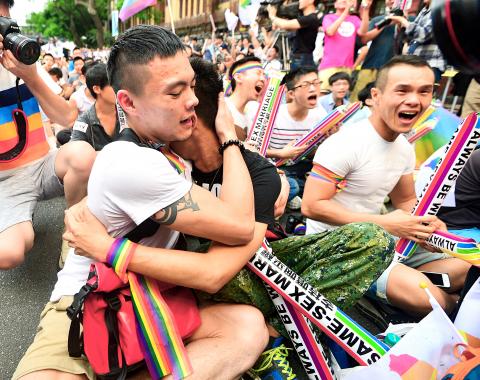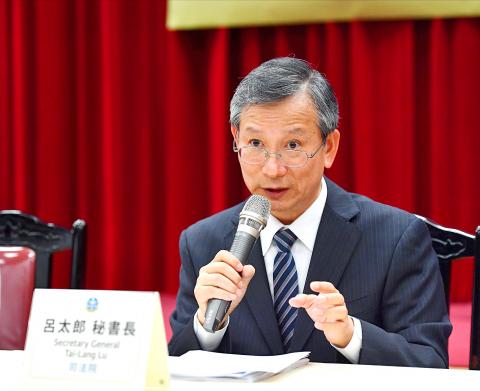The Council of Grand Justices yesterday ruled that the Civil Code, which says an agreement to marry can only be made between a man and a woman, “violated” constitutional guarantees of freedom of marriage and equality.
The landmark Constitutional Interpretation No. 748 rules in favor of allowing homosexual couples to register for marriage, and grand justices have asked the legislature to amend relevant laws within two years to protect the interests of homosexuals.
If the government has not changed the law in two years, same-sex couples will be allowed to register their union at household registration offices, Judicial Yuan Secretary-General Lu Tai-lang (呂太郎) said.

Photo: Wang Yi-sung, Taipei Times
The Civil Code violates the freedom of marriage and equal rights for all citizens as guaranteed by the Constitution, Lu said.
The grand justices made the ruling after receiving two requests for a constitutional interpretation of the issue.
One request was filed by veteran gay rights advocate Chi Chia-wei (祁家威) in 2015 after his attempt to register his same-sex marriage was rejected by Taipei’s Wanhua District (萬華) household registration office in 2013 and subsequent court appeals failed.

Photo: CNA
The other request was filed by the Taipei Department of Civil Affairs in 2015, after three same-sex couples filed an administrative lawsuit against the government after their marriage registrations were rejected by the department.
Justice Huang Jui-ming (黃瑞明) abstained from the vote and took no part in deliberations, the ruling said.
Dissenting opinions were filed by Justice Huang Horng-shya (黃虹霞) and Justice Wu Chen-huan (吳陳鐶).
“Marriage is a union between a man and a woman, who live life together as an institution, which is protected by the Constitution. Making changes would involve altering social and cultural values, which should not be made by merely copying developments in other nations... Therefore, the decision to legalize same-sex marriage should be made by a referendum,” Wu said.
It is a fallacy to rule that Civil Code provisions are unconstitutional, Huang Horng-shya said.
Same-sex marriage is not a fundamental human right to be universally protected, she said.
She said that she supports legislating legal protections of civil unions for same-sex adults, but does not view a homosexual union the same way as a marriage between a man and a woman.
Among the main reasons cited for the majority decision were that prior interpretations mentioning “husband and wife” or “a man and a woman” were made within the context of heterosexual marriage.
“This court has not made any interpretation on the issue of whether two people of the same sex are allowed to marry,” the ruling said.
The Civil Code does not require the ability to procreate as a requirement for marriage and reproduction is not an essential element of marriage, the ruling said, adding that procreation should not be an essential element of marriage.
Opposition to same-sex marriage based on safeguarding social and ethical values is incompatible with the spirit and meaning of equal rights as protected by the Constitution, the ruling said.
The Judicial Yuan also issued a three-page abstract on the ruling in Chinese and English, to accompany Constitutional Interpretation No. 748, which is 24 pages long.
Legal experts said it was rare for the Judicial Yuan to issue an English-language statement of a constitutional interpretation. They see the move as an official declaration to the international media of the decision that has made Taiwan the first Asian nation to recognize same-sex unions.
In response to media queries over whether same-sex foreign nationals could register their marriage in Taiwan, Lu did not give a direct answer, but said they would have to abide by provisions in the Act Governing the Choice of Law in Civil Matters Involving Foreign Elements (涉外民事法律適用法).
additional reporting by CNA

A Ministry of Foreign Affairs official yesterday said that a delegation that visited China for an APEC meeting did not receive any kind of treatment that downgraded Taiwan’s sovereignty. Department of International Organizations Director-General Jonathan Sun (孫儉元) said that he and a group of ministry officials visited Shenzhen, China, to attend the APEC Informal Senior Officials’ Meeting last month. The trip went “smoothly and safely” for all Taiwanese delegates, as the Chinese side arranged the trip in accordance with long-standing practices, Sun said at the ministry’s weekly briefing. The Taiwanese group did not encounter any political suppression, he said. Sun made the remarks when

The Taiwanese passport ranked 33rd in a global listing of passports by convenience this month, rising three places from last month’s ranking, but matching its position in January last year. The Henley Passport Index, an international ranking of passports by the number of designations its holder can travel to without a visa, showed that the Taiwan passport enables holders to travel to 139 countries and territories without a visa. Singapore’s passport was ranked the most powerful with visa-free access to 192 destinations out of 227, according to the index published on Tuesday by UK-based migration investment consultancy firm Henley and Partners. Japan’s and

BROAD AGREEMENT: The two are nearing a trade deal to reduce Taiwan’s tariff to 15% and a commitment for TSMC to build five more fabs, a ‘New York Times’ report said Taiwan and the US have reached a broad consensus on a trade deal, the Executive Yuan’s Office of Trade Negotiations said yesterday, after a report said that Washington is set to reduce Taiwan’s tariff rate to 15 percent. The New York Times on Monday reported that the two nations are nearing a trade deal to reduce Taiwan’s tariff rate to 15 percent and commit Taiwan Semiconductor Manufacturing Co (TSMC, 台積電) to building at least five more facilities in the US. “The agreement, which has been under negotiation for months, is being legally scrubbed and could be announced this month,” the paper said,

Japan and the Philippines yesterday signed a defense pact that would allow the tax-free provision of ammunition, fuel, food and other necessities when their forces stage joint training to boost deterrence against China’s growing aggression in the region and to bolster their preparation for natural disasters. Japan has faced increasing political, trade and security tensions with China, which was angered by Japanese Prime Minister Sanae Takaichi’s remark that a Chinese attack on Taiwan would be a survival-threatening situation for Japan, triggering a military response. Japan and the Philippines have also had separate territorial conflicts with Beijing in the East and South China